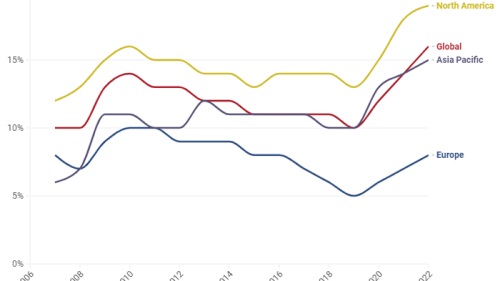Recent advances in property technology (proptech) applications can enable smaller real estate operators to boost their operational capabilities and improve their tenants’ experience if they learn to think strategically about how to use the tools, panelists said Tuesday at the ULI Spring Meeting in Toronto.
David Thomas, who doubles as director of both portfolio management and innovations at Veritas Investments, a San Francisco–based property management company, said proptech—a catchall term for applications in areas ranging from maintenance and accounting to provision of self-guided tours—can help smaller property owners survive and prosper, even without the economies of scale that benefit giant real estate investment trusts.
“Think about places like San Francisco: 100-year-old buildings with 20- to 30-unit averages—not something that most institutional investors are looking at—typically owned by mom-and-pop operators,” said Thomas. “We’ve been able to go in and efficiently run that type of asset through the use of a lot of technology.”
Virginia Love, industry principal at property management software firm Entrata, said the role of proptech in commercial real estate has evolved significantly in recent years. While automating portions of the business was once seen primarily as a means of controlling expenses, it is now more important as a way to improve the experience for tenants and on-site workers at properties.
“What small to midsize enterprises can learn from bigger companies is that the big companies are paying attention to the data,” said panel moderator Donald Davidoff, chief executive officer of Real Estate Business Analytics, a technology leader in the multifamily residential segment, and head of consulting firm D2 Demand Solutions.
Proptech enables smaller operators to amass and analyze data about their operations and gain a competitive advantage, panelists said. Possessing and being able to work with that information to automate operations in some ways can be more powerful than even the latest artificial intelligence (AI) advances.
“When you think about the way that AI and ChatGPT is used today, it’s using public datasets,” said Jennifer Tindle, founder and chief executive officer of CREx, a software analytics and integration firm that enables clients to get data out of Yardi, Salesforce, HubSpot, and other platforms. “What’s not available to competitors is your own data.”
But smaller real estate operators may also be able to leverage their own data to get even more value—by sharing it selectively with companies in other segments of real estate. A multifamily residential real estate company, for example, may be able to trade insights with another firm that owns office buildings, helping both of their businesses.
“I would say that your data is your competitive advantage long term if you want to pay with the big guys,” Tindle said.
Troy Crema, cofounder and chief executive officer of Grata, a maker of a smart living operating system for apartments, said proptech can enable companies to improve their maintenance operations and work with contractors. For example, the ability to time stamp entries through doors makes it possible to see when contractors actually show up on site, helping eliminate situations in which they only work a portion of the time that they bill for.
How effectively proptech can be used depends in part on how the head of technology fits into the management structure, Davidoff noted. In some companies, that leader reports to the chief financial officer, whereas in others that person is overseen by the chief legal officer or the chief information officer. Love thinks having the technology chief report to the chief operating officer is the best arrangement.
Having someone in management responsible for overseeing innovation is also crucial, panelists agreed, while adding that the innovation leader does not necessarily have to be skilled at writing software code or possess some other technical skill. It is more important to have someone who understands the various parts of the business itself and can figure out how to apply tech breakthroughs to improve their performance.
“We work with a lot of accidental technologists, and I would put myself under that category,” Love said.
Thomas, his firm’s innovation leader, seconded that notion. “I started out as a leasing agent,” he said. “So I kind of grew up in the real estate world, doing all sorts of different things. And I have a dual role now: I manage a portfolio of assets as an asset manager. And I do think my hope is why I’m able to do [innovation] so well is that I’ve done all those different roles. I’ve been a property manager; I’ve done construction; I know the leasing agents. So I’ve dealt with the problems firsthand that we’re trying to solve.”





